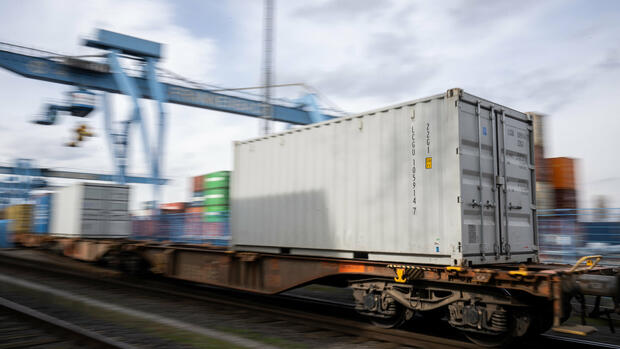Exports to the EU countries fell in March by 6.2 percent compared to the previous month to 69.3 billion euros.
(Photo: dpa)
Berlin After a strong start to the year, German exporters suffered an unexpectedly severe setback in March. Due to the weaker demand from the most important markets EU, USA and China, their exports collapsed by 5.2 percent compared to the previous month to 129.7 billion euros. This was announced by the Federal Statistical Office on Thursday.
In January there was still an increase of 2.7 percent, in February even 4.0 percent. Economists surveyed by the Reuters news agency had expected a minus, but only by 2.4 percent. Imports even fell by 6.4 percent to 113.0 billion euros.
“The global economy is not running smoothly: High inflation rates, rising interest rates and the geopolitical uncertainties that have grown with the war in Ukraine are putting pressure on companies’ investment mood,” said Thomas Gitzel, chief economist at VP Bank. “The export-heavy German economy is feeling the effects of this.”
His colleague Alexander Krüger from Hauck Aufhäuser Lampe Privatbank considers the setback to be manageable. “No jag breaks out of the crown of the sector,” said the chief economist. “Export levels are high, material shortages are decreasing and export expectations are improving.”
Exports to the EU countries fell in March by 6.2 percent compared to the previous month to 69.3 billion euros. The USA remained the number one buyer country: Goods worth 12.5 billion euros were sold there, a drop of 10.9 percent. Exports to China fell 9.3 percent to 7.7 billion euros, while those to the UK grew 1.5 percent to 6.4 billion euros. Exports to Russia increased by 1.8 percent to 0.9 billion euros.
Good mood among exporters
The mood among German exporters is currently better than it has been since the start of the Russian war against Ukraine a good year ago, which speaks for a return to growth.
That’s what economists say about the slump in exports
The barometer for their export expectations rose by 2.8 to 6.8 points in April, as the Munich Ifo Institute recently determined in its monthly company survey. “After a weak start to the year, exports are likely to grow again in the second quarter,” said Klaus Wohlrabe, head of Ifo surveys.
Nevertheless, the German Chamber of Industry and Commerce (DIHK) has more than halved its forecast for export growth this year, citing the difficult environment such as rising interest rates, high inflation and increasing protectionism as the reason for this.
German exports are only likely to increase by one percent when adjusted for inflation (in real terms), said DIHK foreign trade chief Volker Treier recently. An increase of 2.5 percent had previously been expected.
More: How labor shortages can ‘lead to double dividends’
